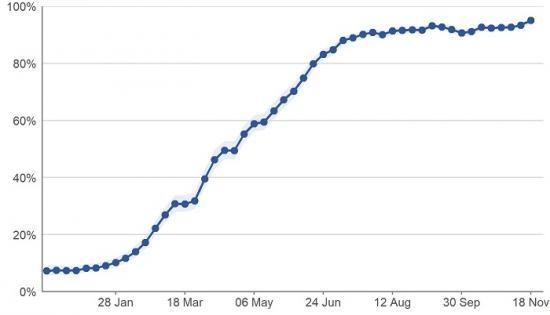Coronavirus (covid-19): ONS Infection Survey - Antibody Data - 8 December 2021
8th December 2021

Antibody data from the ONS COVID-19 infection survey published 8 December 2021.
This publication presents an analysis of antibody prevalence, which can be used to identify individuals who have had COVID-19 in the past or who have developed antibodies as a result of vaccination.
The findings presented in this publication are based on data from the Office for National Statistics (ONS) COVID-19 Infection Survey.
The COVID-19 Infection Survey aims to measure:
how many people test positive for COVID-19 infection at a given point in time, regardless of whether they report experiencing coronavirus symptoms
the average number of new infections per week over the course of the study
the number of people who test positive for antibodies, to indicate how many people are ever likely to have had the infection or have been vaccinated
All results are provisional and subject to revision.
The Office for National Statistics (ONS) publish estimates for England, Wales, Northern Ireland and Scotland on their website.
The underlying data displayed in the charts in this publication is available in the reference tables on the ONS website.
Main points
In Scotland, it is estimated that over 9 in 10 adults, or 95.0% of the adult (aged 16+) population living in private residential households (95% credible interval: 94.0% to 95.9%) would have tested positive for antibodies to SARS-CoV-2 from a blood sample in the week beginning 15 November 2021, suggesting that they had the infection in the past or have been vaccinated.
Antibody positivity has continued to remain high in Scotland. In recent weeks, the percentage of adults testing positive for antibodies has increased among all age groups. There has been an increase in those aged 65 and over since early October 2021, likely as a result of the vaccination booster programme. The percentage of adults testing positive for antibodies in each age group ranged from 91.9% to 97.1% in the week beginning 15 November.
As detailed by ONS, there is a clear pattern between vaccination and testing positive for COVID-19 antibodies but the detection of antibodies alone is not a precise measure of the immunity protection given by vaccination.
Information on this release
In this publication, the following terminology is used:
Antibodies - the presence of antibodies to SARS-CoV-2 is measured in the adult (16+) population living in private residential households (excludes those in hospitals, care homes and/or other institutional settings) to understand who has had COVID-19 in the past, and the impact of vaccinations. It takes between two and three weeks after infection or vaccination for the body to make enough antibodies to fight the infection. Having antibodies can help to prevent individuals from getting the infection. Once infected or vaccinated, antibodies remain in the blood at low levels and can decline over time. The length of time antibodies remain at detectable levels in the blood is not fully known
SARS-CoV-2 - this is the scientific name given to the specific virus that causes COVID-19
The presence of antibodies in the adult (16+) population living in private residential households is measured to understand who has had COVID-19 in the past and the impact of vaccinations. It takes between two and three weeks after infection or vaccination for the body to make enough antibodies to fight the infection. Having antibodies can help to prevent individuals from getting the infection and if they do get infected, they are less likely to have severe symptoms. It does not guarantee that an individual cannot be infected with COVID-19.
There is high uncertainty around COVID-19 Infection Survey estimates due to the relatively small number of people included in this analysis, so caution should be taken in interpreting the results.
The most recent antibody estimates in this publication include data from 15 to 20 November 2021.
Modelled vaccination estimates for Scotland require additional quality assurance and ONS have not provided these this week. They will be reintroduced as soon as possible.
Further information on the methodology can be found at the end of this release.
Antibody estimates: likelihood of testing positive for antibodies to SARS-CoV-2
In Scotland, it is estimated that over 9 in 10 adults, or 95.0% of the adult (16+) population living in private residential households (95% credible interval: 94.0% to 95.9%) would have tested positive for antibodies to SARS-CoV-2 from a blood sample in the week beginning 15 November 2021, suggesting that they had the infection in the past or have been vaccinated. Antibody positivity has continued to remain high in Scotland in recent weeks. Please see footnote 1 for information on credible intervals.
Modelled weekly estimates of the percentage of people testing positive for antibodies to SARS-CoV-2 from a blood sample, are displayed in Figure 1 as estimates for the midpoint of the week.
Figure 1: Modelled weekly percentage of people in the adult population living in private residential households testing positive for antibodies to SARS-CoV-2 from a blood sample, from 7 December 2020 to the week beginning 15 November 2021, including 95% credible intervals.
To read the full report go HERE
